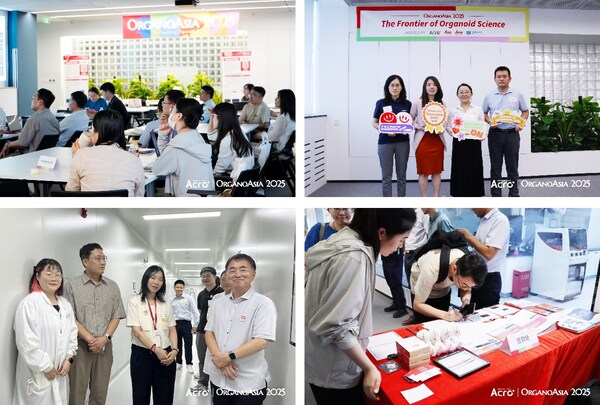Science
Leading Scientists Gather in Beijing for OrganoAsia 2025 Conference

On October 10, 2025, ACROBiosystems, in collaboration with Leica Biosystems and Molecular Devices, hosted the OrganoAsia 2025 conference in Beijing. This hybrid event attracted over 500 experts in organoid research, primarily from China, Japan, and South Korea, along with global attendees. The focus was on advancing organoid technology in precision medicine, drug discovery, and regenerative medicine.
Expert Insights into Organoid Advances
Among the key speakers were leading figures in the field, including Rosanna Zhang, Vice President of ACROBiosystems; Li Liang, Associate Professor at Southern University of Science and Technology (SUSTech); Ki-Suk Kim, Principal Researcher at the Korean Institute of Toxicology; Na Jie from Tsinghua University; and Yoh-Ichi Tagawa from the Institute of Science Tokyo. They shared groundbreaking research on disease modeling, drug screening, and toxicology assessments.
In her presentation, Rosanna Zhang highlighted the innovative applications of organoids in drug screening and toxicity testing. She emphasized that as regulatory policies evolve to favor alternatives to animal testing, organoid technology is emerging as a pivotal tool that closely mimics human physiology. ACROBiosystems has launched various ready-to-use organoid products, covering vital organs such as the heart, brain, and liver, and aims to expand its portfolio to enhance drug discovery processes.
Li Liang’s team at SUSTech has made notable contributions by establishing a biobank of patient-derived organoids that replicate organ microenvironments. During the COVID-19 pandemic, they utilized a respiratory organoid platform to examine tissue responses to different SARS-CoV-2 variants, leading to the discovery of an effective horse-derived polyclonal antibody. Their work also includes developing a dual-channel “organ-on-a-chip” system, which models gut-microbiome interactions, paving the way for further exploration in regenerative medicine.
Innovations in Toxicology and Drug Development
Professor Ki-Suk Kim’s research at the Korean Institute of Toxicology focused on leveraging 3D organoid models for toxicology assessments. His team engineered heart organoids that replicate human cardiac function, utilizing multi-ion channel detection combined with microelectrode array technology for precise drug impact evaluations. In neurodevelopmental toxicity studies, they revealed how specific drugs impair brain development and identified compounds that may mitigate this toxicity.
At Tsinghua University, Associate Professor Na Jie’s team utilized human pluripotent stem cells to create vascular organoids that enhance tissue repair capabilities. They integrated macrophages with heart organoids, significantly improving cardiomyocyte maturation and contractility. Their research also produced vascularized and immune cell-infiltrated cerebral organoids, which showed promise in promoting recovery in ischemic stroke models.
Meanwhile, Associate Professor Yoh-Ichi Tagawa’s group developed a microfluidic gut-on-a-chip system to model Inflammatory Bowel Disease. By co-culturing human intestinal cells with gut microbiota, they generated an induction model that elucidated the interactions between gut microbiota and immune cells, while also confirming the therapeutic efficacy of specific inhibitors.
The roundtable discussions at the conference underscored the importance of standardization and industrialization in organoid research. Participants called for enhanced data sharing, harmonization of operational protocols, and greater regulatory acceptance of organoid models in drug development. The goal is to create a robust framework that allows for reproducible testing, while overcoming the challenges of generating organoids that closely resemble adult human tissues.
As the conference concluded, ACROBiosystems reaffirmed its commitment to fostering international collaboration in the organoid research field. The company aims to strengthen the Asia-Pacific ecosystem by bridging the gap between research and industry, facilitating the advancement of organoid technology in drug discovery and precision medicine.
Founded in 2010 and publicly listed in 2021, ACROBiosystems is dedicated to supporting the biopharmaceutical and healthcare sectors with innovative solutions. With operations in over 10 cities globally, the company collaborates with top pharmaceutical firms and academic institutions to drive advancements in drug development.
-

 World5 months ago
World5 months agoSouth Korea’s Foreign Minister Cho Hyun to Visit China This Week
-

 Business5 months ago
Business5 months agoStarling Bank Plans Secondary Share Sale, Targeting $5.4 Billion Valuation
-

 Top Stories5 months ago
Top Stories5 months agoMunsang College Celebrates 100 Years with Grand Ceremony
-

 World5 months ago
World5 months agoPAS Aims to Expand Parliamentary Influence in Upcoming Election
-

 Business7 months ago
Business7 months agoKenvue Dismisses CEO Thibaut Mongon as Strategic Review Advances
-

 Lifestyle6 months ago
Lifestyle6 months agoHumanism Camp Engages 250 Youths in Summer Fest 2025
-

 Sports6 months ago
Sports6 months agoDe Minaur Triumphs at Washington Open After Thrilling Comeback
-

 Sports7 months ago
Sports7 months agoTupou and Daugunu Join First Nations Squad for Lions Clash
-

 Top Stories7 months ago
Top Stories7 months agoColombian Senator Miguel Uribe Shows Signs of Recovery After Attack
-

 World7 months ago
World7 months agoASEAN Gears Up for Historic Joint Meeting of Foreign and Economic Ministers
-

 Health6 months ago
Health6 months agoNew Study Challenges Assumptions About Aging and Inflammation
-

 Business7 months ago
Business7 months agoOil Prices Surge Following New EU Sanctions on Russia









